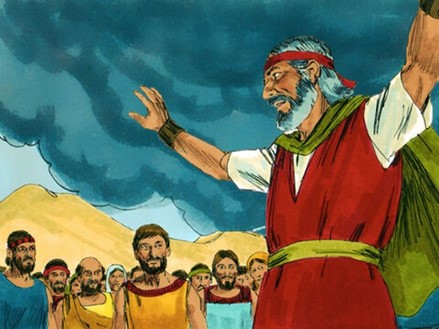Good morning!
Greetings in the name of the Father, the Son, and the Holy Spirit.
But among you it will be different. Those who are the greatest among you should take the lowest rank, and the leader should be like a servant. (Luke 22:26)

Leadership is a theme that resonates in our day-to-day lives. We see it, we practice it, and sometimes we are molded by it. Leadership is not limited to those who hold high-ranking positions or wield substantial influence. It’s not solely about the execution of authority or power. Each one of us, in our roles as parents, teachers, mentors, friends, and even teammates, are leaders in our own right. These roles might seem trivial, but they are in fact the crucibles where authentic leadership is forged and tested. And it is within these contexts that the true essence of leadership emerges—not in domineering or asserting authority but in expressing compassion, empathy, and service, stirring a transformative impact that radiates outwards, touching and transforming others.
One such depiction of transformative leadership is narrated in Exodus 32, a story that brings to light the inspiring leadership of Moses. God had chosen Moses to guide the Israelites, and in this scripture, we see him emerge as a figure of extraordinary leadership under testing circumstances. The Israelites, despairing and doubting during Moses’ absence, had veered from their covenant with God, creating and worshiping a golden calf—a grave transgression that ignited God’s wrath and left them on the brink of destruction.
Confronted with this turmoil, Moses made a choice that would define his leadership. Instead of separating himself from his people to safeguard his own relationship with God, he chose to stand alongside them, willingly putting himself at risk of divine displeasure. He interceded for the Israelites, fervently pleading for God’s mercy on their behalf. This critical moment in the narrative uncovers the quintessence of compassionate leadership.
The leadership of Moses, outlined in Exodus 32, becomes a mirror for us to reflect upon our own leadership. A mirror that invites us to ask: “How are we leading in our respective roles? Are we exercising compassionate leadership? Are we willing to intercede for and stand with those we lead, even in the face of adversity?” It is in asking these questions, that we find the true meaning of leadership, and begin the journey of transformation, not just for those we lead, but also for ourselves. Leadership, in its truest sense, is a mutual journey of transformation driven by compassion and service, as exemplified by Moses.

The Heart of Compassion
At the core of effective leadership lies compassion, a quality often overlooked amidst the routine drumbeats of power and authority. True leadership is not about exalting oneself above others but involves stepping down to understand and share in the experiences of those you lead. One of the most enlightening illustrations of this compassionate leadership is found in Exodus 32, where Moses intercedes on behalf of the Israelites.
Informed by God of the Israelites’ grave transgression and the imminent divine wrath they had invoked, Moses faced a pivotal decision. He could have chosen to disassociate himself from his wayward people to secure his personal standing with God. Instead, he opted to empathize with them and advocate for their survival, showcasing a depth of compassion seldom seen. His plea to God on behalf of his errant people was not just a request—it was an act of selfless love, embodying the true spirit of compassionate leadership.
Parallel threads of such profound compassion and empathy are woven throughout the tapestry of the New Testament as well. Jesus, the embodiment of perfect leadership, is often seen moved by compassion for the crowds. In the book of Matthew, we find him looking upon the masses and seeing them as “harassed and helpless, like sheep without a shepherd” (Matthew 9:36). This empathetic gaze does not come from a place of superiority, but from a heart filled with love and concern. Jesus, like Moses, chooses to advocate for and serve those under his care, mirroring Moses’s compassionate leadership centuries later.
These stories are not just historical narratives; they are timeless reminders of the heart of true leadership. They echo down the corridors of time, challenging us in our leadership roles. They encourage us to see beyond the confines of our positions of power and to recognize the humanity and struggles of those we lead.
The compassionate hearts of Moses and Jesus urge us to be leaders who carry the burdens of those under our care, not out of obligation but out of genuine concern and empathy. They inspire us to be leaders who step into the shoes of those we lead, understanding their struggles, feeling their pain, and then using our position to help alleviate their burdens.
It’s about understanding that leadership, at its core, is a service to others. It’s about using our positions not to rule with an iron fist, but to extend a helping hand. It’s about realizing that the greatest leaders are not those who stand above the crowd, but those who are willing to walk alongside them, leading not by authority, but by example.
These narratives call upon us to incorporate these virtues into our leadership approach. They remind us that our true worth as leaders lies not in the authority we hold but in the compassion we exhibit. As Paul admonished in Galatians 6:2, “Carry each other’s burdens, and in this way, you will fulfill the law of Christ,” let us strive to fulfill our leadership roles with understanding, compassion, and empathy, transforming ourselves and those we lead.
The Power of Intercession
The biblical account of Moses’s intercession for the Israelites in Exodus 32 is more than a historical anecdote—it’s a powerful exemplification of spiritual leadership. A leader’s role, as illustrated here, is not just to guide but also to serve as an intercessor, standing in the gap between divine judgment and human frailty.
Moses was confronted with the terrifying news of God’s wrath against the Israelites for their idolatrous act. Yet, he chose to step forward and stand in the breach. He pleaded fervently with God to spare his people, acting as their mediator and shield. This act of intercession was more than just an appeal; it was a testament to Moses’s selflessness, as he prioritized the welfare of his people over his own interests. In his plea, he showcased a love that was willing to risk divine displeasure for the sake of those he led.
This image of Moses interceding for his people offers a compelling parallel to the role of Jesus Christ as depicted in the New Testament. We see a clear echo of Moses’s intercession in the life and ministry of Jesus. Hebrews 7:25 tells us, “Therefore he [Jesus] is able to save completely those who come to God through him, because he always lives to intercede for them.” Jesus, like Moses, serves as a mediator, tirelessly interceding on behalf of humanity, bridging the gap between us and God.
The intercessory roles of both Moses and Jesus provide a profound lesson for anyone in a position of leadership. True leaders do not stand aloof or indifferent to the plight of those under their care. Instead, they place themselves in the breach, advocating and interceding for them, even when it comes at personal cost.
Moreover, Moses and Jesus’s intercessory roles underscore the principle that leadership is a relationship of deep empathy and responsibility. It’s about advocating for those who cannot speak for themselves, or standing up for them when they are at their most vulnerable. They remind us that as leaders, we are called not only to lead but also to intercede.
As Paul writes in his first letter to Timothy, “I urge, then, first of all, that petitions, prayers, intercession and thanksgiving be made for all people” (1 Timothy 2:1). In the same way, we are encouraged to intercede for those we lead, praying for their wellbeing and standing up for them in times of difficulty.
Thus, the biblical accounts of Moses and Jesus call us to a higher form of leadership, one that combines authority with compassion and a willingness to intercede. They remind us that true leaders are not just commanders but caregivers, not just bosses but bridges, ready to stand in the gap for their people. As leaders, may we embrace this call to intercession, transforming our leadership into a ministry of compassion, advocacy, and service.

The Courage to Confront with Truth and Love
Following his successful intercession on behalf of the Israelites, Moses faced another challenging leadership task—confronting the people about their sinful actions. Their idolatry was a direct affront to God’s commandments and Moses, despite his compassion for them, recognized the importance of addressing their transgressions. Here, he embodied a crucial aspect of leadership: the courage to confront.
Leadership isn’t solely about making popular decisions; it’s about having the courage to confront, correct, and guide when necessary. It’s about the willingness to stand up for what’s right, even if it means going against the crowd. Moses exhibited this courage superbly. Despite knowing that his confrontation might cause unrest, he held his ground. His commitment to God’s law overpowered his fear of disagreement or backlash. He confronted the Israelites, dismantled the golden calf, and enacted justice, steering his people back onto the path of righteousness.
This aspect of Moses’s leadership is deeply aligned with the teachings of Jesus in the New Testament. In Matthew 18:15-17, Jesus lays out a clear guideline for confronting wrongdoing: “If your brother or sister sins, go and point out their fault, just between the two of you. If they listen to you, you have won them over.” This verse emphasizes the importance of open, direct confrontation aimed at reconciliation rather than retaliation or humiliation. It highlights the value of turning someone from their wrong ways, a principle Moses adhered to when dealing with the Israelites.
However, Jesus doesn’t stop there. He goes on to say, “But if they will not listen, take one or two others along, so that ‘every matter may be established by the testimony of two or three witnesses.'” And, if they still do not listen, “tell it to the church; and if they refuse to listen even to the church, treat them as you would a pagan or a tax collector.” Here, Jesus underscores the need for persistent confrontation in the face of persistent wrongdoing, just as Moses demonstrated with his people.
The courage to confront, as exhibited by Moses and advocated by Jesus, is an indispensable aspect of effective leadership. It calls upon leaders to not turn a blind eye to wrongdoing but to address it head-on, despite the discomfort it might cause. It’s a testament to a leader’s commitment to uphold righteousness and justice, even if it means standing against one’s own people.
This principle extends beyond biblical times, speaking to us in our contemporary contexts as well. Whether we are leaders in our families, communities, workplaces, or churches, we are called to confront unrighteousness and guide those under our charge towards righteousness. As Apostle Paul encourages in Ephesians 4:15, let us “speak the truth in love,” confronting when necessary, but always aiming for reconciliation and growth. This way, we bring together authority and empathy, embodying leadership that is both courageous and compassionate.
Summary and Application to Our Lives
The story of Moses in Exodus 32 reveals the profound contours of compassionate leadership, presenting empathy, intercession, and courageous confrontation as its essential elements. It teaches us that true leadership is not about wielding power, but about manifesting love and selflessness – a lesson that echoes deeply with the teachings of Jesus Christ.
As followers of Christ, we are all called upon to exhibit leadership in our individual contexts. This could be in formal, recognized positions, or in the quiet, unseen aspects of our lives – as parents, friends, mentors, or neighbors. This leadership is not defined by titles or hierarchy, but by the impact we make on the lives of those around us. It calls for the embodiment of Christ-like qualities – compassion, courage, humility, and servitude – to effect positive change.
The journey of leadership, as exemplified by Moses, can be a challenging one. It requires a willingness to empathize deeply with those we lead, the readiness to intercede fervently on their behalf, and the courage to confront wrongdoing directly. However, we are not alone in this journey. As God was with Moses, He is with us too, guiding us, empowering us, and equipping us to face any circumstance.
As we reflect on Moses’s leadership and draw inspiration from the humility of Jesus Christ, let us aim to manifest these qualities in our leadership. Let’s remember the exhortation of Paul in Philippians 2:3-4, “Do nothing out of selfish ambition or vain conceit. Rather, in humility value others above yourselves, not looking to your own interests but each of you to the interests of the others.” Our calling as leaders is not to assert our own interests, but to prioritize the well-being and growth of others.
The most transformative leadership we can offer is one that mirrors the heart of God, a leadership that models Christ’s selfless love, servant-heartedness, and unwavering commitment to truth. As we embrace such leadership, we not only honor our divine calling but also leave an indelible positive imprint on our world.
So, let’s move forward, inspired by Moses’s compassionate leadership and guided by the love and humility of Jesus Christ. Let’s strive to reflect these examples in our leadership journey, to value others above ourselves, and to consider their interests as our own, embodying the humility and servanthood that marked Christ’s leadership. Remember, leadership is not about being served but about serving others, just as “the Son of Man did not come to be served, but to serve, and to give his life as a ransom for many.” (Matthew 20:28). Amen.

But among you it will be different. Those who are the greatest among you should take the lowest rank, and the leader should be like a servant. (Luke 22:26)
